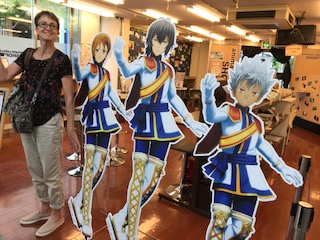Nina Langton is an Associate Professor teaching Japanese language and culture courses in the Department of Languages and World Literatures. Nina is grateful to have grown up in the North Okanagan on the traditional unceded land of the Syilx Okanagan Peoples. After long-term stays in Japan, university, work, travel and more time working and studying in Japan, she returned in 1992 and started teaching Japanese language at Okanagan University College. After OUC became UBC Okanagan, she added Japanese culture and film courses to her teaching schedule. She loves being able to live, teach and research with wonderful colleagues, students, family and friends in this beautiful valley.
Tell us about your research interests and teaching practices.
I studied contemporary Japanese literature during my master’s programme, and while I still enjoy reading Japanese fiction, my research up until now has been aligned with what I spend most of my time teaching, which is Japanese language. I’ve never been much of a computer geek, but from the start of my teaching I have incorporated the computer as a tool for learning, and a lot of my research and teaching activities have revolved around how best to do that. For example, I’ve looked into the impact of using the internet to connect my students with conversation partners in Japan, I’ve supervised the creation of online animated manga and games and analyzed their efficacy in the teaching Japanese orthography, I’ve investigated the use of screencasting for giving feedback, and have examined different modalities for teaching foreign languages online. There are so many innovative ways we can use the computer to facilitate language learning and connect students with a culture that might not be so familiar to them, so of course it is an indispensable tool, as we discovered during our COVID year. But as I think we also discovered during that year, the relationship between student, teacher and peers in addition to the course content forms the foundation for learning, and I try my best to create an environment where students can interact with all those elements in the most productive way.
How did you know you wanted to be a professor?
I’m not sure that I ever “knew” I wanted to be a professor, and there was a lot of serendipity and a certain degree of practicality involved in me becoming one. I knew that I enjoyed teaching and learning, and that I wanted to share my knowledge of Japan and the Japanese language with others, so I feel very fortunate that I am able to do that as a career.
What kind of learning experiences do offer your students?
In my language classes, I had been experimenting with flipping the classroom even before COVID hit, and I really like that approach, so I pre-record all my grammar and orthography explanations so that we can use classroom time for pair and group work, giving students the maximum amount of time to practice the language. I also like to do a lot of project work so that we can explore current and relevant topics and the aspects of Japanese culture that students are most interested in. In my film and pop culture courses, I try to introduce the foundational knowledge of the field while creating an environment that encourages student-led discovery and discussion.
You recently received funding from the Open Educational Research Grant program at UBCO. Tell us about the project.
I’ve recently returned to an area of study that I first became interested in when I was an undergrad. I had spent a year in Hokkaido, Japan, between second and third year, and was fortunate to learn a bit about the Ainu, the Indigenous Peoples of the region. I wrote my fourth-year major paper on their oral literature, and now I’m looking at ways to share that literature as well as information about the history and culture of the Ainu with my students. I think the initiatives undertaken by UBC to indigenize the curriculum are important, so I’d like to contribute to that if I can, and I hope to do so by producing an open textbook that can be used not only by instructors and students at UBC, but by anyone who is interested in the material.
Introducing Ainu Content to Japanese Language Students Project

